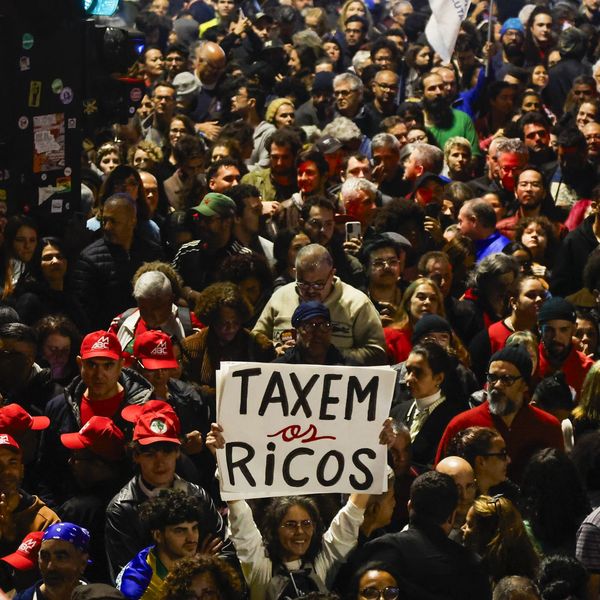
Mothers stay with malnourished children at Kaabong hospital in Uganda on May 25, 2022. (Photo: Badru Katumba/AFP via Getty Images)
Just Two Weeks of Food Billionaire Wealth Gains Could Fund Anti-Hunger Effort in East Africa
"One person is dying every 48 seconds in Ethiopia, Kenya, and Somalia alone," said Oxfam. "Against this backdrop, food billionaires have increased their collective wealth by $382 billion since 2020."
The aid group Oxfam International estimated Monday that a mere two weeks of wealth gains recently secured by global food billionaires would be enough to fully fund the United Nations' multibillion-dollar effort to combat hunger in East Africa, where soaring commodity prices are intensifying food insecurity and pushing poverty to new extremes.
"A monstrous amount of wealth is being captured at the top of our global food supply chains."
"Food inflation in East African countries where tens of millions of people are caught in an alarming hunger crisis has increased sharply, reaching a staggering 44% in Ethiopia--nearly five times the global average," Oxfam said in a new analysis published amid a worsening global hunger emergency.
"It is estimated that one person is dying every 48 seconds in Ethiopia, Kenya, and Somalia alone, where the worst drought in decades is being exacerbated by the war in Ukraine and is pushing food prices to skyrocketing levels," the organization said. "Against this backdrop, food billionaires have increased their collective wealth by $382 billionaire since 2020."
"Less than two weeks' worth of their wealth gains," the group calculated, "would be more than enough to fund the entirety of the U.N.'s $6.2 billion humanitarian appeal for East Africa. The appeal is currently woefully funded at merely 16%."
In late May, Oxfam issued a report showing that "corporations and the billionaire dynasties who control so much of our food system are seeing their profits soar" in the midst of surging prices and hunger worldwide. The crisis has hit particularly hard in East Africa, a region heavily reliant on imports.
"There have been 62 food billionaires created in the last two years," Oxfam found, pointing to the global food corporation Cargill--one of a handful of businesses that collectively control more than 70% of the worldwide market for agricultural commodities--as a striking case in point.
Cargill is "87% owned by the 11th richest family in the world," Oxfam observed. "The combined wealth of family members listed on the Forbes billionaire list is $42.9 billion--and their wealth has increased by $14.4 billion (65%) since 2020, growing by almost $20 million per day during the pandemic. This has been driven by rising food prices, especially for grains. Four more members of the extended Cargill family have recently joined the list of the richest 500 people in the world."
Related Content

'Broken' Capitalist Food System Drives Soaring Global Hunger: Oxfam
Hanna Saarinen, Oxfam's food policy lead, said Monday that "a monstrous amount of wealth is being captured at the top of our global food supply chains, meanwhile rising food prices contribute to a growing catastrophe which is leaving millions of people unable to feed themselves and their families."
"World leaders are sleepwalking into a humanitarian disaster," Saarinen warned. "This fundamentally broken global food system--one that is exploitative, extractive, poorly regulated, and largely in the hands of big agribusinesses--is becoming unsustainable for people and the planet and is pushing millions in East Africa and worldwide to starvation."
Oxfam argued there are a number of steps rich countries can take to help East African nations avert disaster, including canceling their surging debt burdens and taxing the rich to adequately fund humanitarian relief efforts.
"We need to reimagine a new global food system to really end hunger; one that works for everyone," said Saarinen. "Governments can and must mobilize enough resources to prevent human suffering. One good option would be to tax the mega-rich who have seen their wealth soar to record levels during the past two years."
An Urgent Message From Our Co-Founder
Dear Common Dreams reader, The U.S. is on a fast track to authoritarianism like nothing I've ever seen. Meanwhile, corporate news outlets are utterly capitulating to Trump, twisting their coverage to avoid drawing his ire while lining up to stuff cash in his pockets. That's why I believe that Common Dreams is doing the best and most consequential reporting that we've ever done. Our small but mighty team is a progressive reporting powerhouse, covering the news every day that the corporate media never will. Our mission has always been simple: To inform. To inspire. And to ignite change for the common good. Now here's the key piece that I want all our readers to understand: None of this would be possible without your financial support. That's not just some fundraising cliche. It's the absolute and literal truth. We don't accept corporate advertising and never will. We don't have a paywall because we don't think people should be blocked from critical news based on their ability to pay. Everything we do is funded by the donations of readers like you. Will you donate now to help power the nonprofit, independent reporting of Common Dreams? Thank you for being a vital member of our community. Together, we can keep independent journalism alive when it’s needed most. - Craig Brown, Co-founder |
The aid group Oxfam International estimated Monday that a mere two weeks of wealth gains recently secured by global food billionaires would be enough to fully fund the United Nations' multibillion-dollar effort to combat hunger in East Africa, where soaring commodity prices are intensifying food insecurity and pushing poverty to new extremes.
"A monstrous amount of wealth is being captured at the top of our global food supply chains."
"Food inflation in East African countries where tens of millions of people are caught in an alarming hunger crisis has increased sharply, reaching a staggering 44% in Ethiopia--nearly five times the global average," Oxfam said in a new analysis published amid a worsening global hunger emergency.
"It is estimated that one person is dying every 48 seconds in Ethiopia, Kenya, and Somalia alone, where the worst drought in decades is being exacerbated by the war in Ukraine and is pushing food prices to skyrocketing levels," the organization said. "Against this backdrop, food billionaires have increased their collective wealth by $382 billionaire since 2020."
"Less than two weeks' worth of their wealth gains," the group calculated, "would be more than enough to fund the entirety of the U.N.'s $6.2 billion humanitarian appeal for East Africa. The appeal is currently woefully funded at merely 16%."
In late May, Oxfam issued a report showing that "corporations and the billionaire dynasties who control so much of our food system are seeing their profits soar" in the midst of surging prices and hunger worldwide. The crisis has hit particularly hard in East Africa, a region heavily reliant on imports.
"There have been 62 food billionaires created in the last two years," Oxfam found, pointing to the global food corporation Cargill--one of a handful of businesses that collectively control more than 70% of the worldwide market for agricultural commodities--as a striking case in point.
Cargill is "87% owned by the 11th richest family in the world," Oxfam observed. "The combined wealth of family members listed on the Forbes billionaire list is $42.9 billion--and their wealth has increased by $14.4 billion (65%) since 2020, growing by almost $20 million per day during the pandemic. This has been driven by rising food prices, especially for grains. Four more members of the extended Cargill family have recently joined the list of the richest 500 people in the world."
Related Content

'Broken' Capitalist Food System Drives Soaring Global Hunger: Oxfam
Hanna Saarinen, Oxfam's food policy lead, said Monday that "a monstrous amount of wealth is being captured at the top of our global food supply chains, meanwhile rising food prices contribute to a growing catastrophe which is leaving millions of people unable to feed themselves and their families."
"World leaders are sleepwalking into a humanitarian disaster," Saarinen warned. "This fundamentally broken global food system--one that is exploitative, extractive, poorly regulated, and largely in the hands of big agribusinesses--is becoming unsustainable for people and the planet and is pushing millions in East Africa and worldwide to starvation."
Oxfam argued there are a number of steps rich countries can take to help East African nations avert disaster, including canceling their surging debt burdens and taxing the rich to adequately fund humanitarian relief efforts.
"We need to reimagine a new global food system to really end hunger; one that works for everyone," said Saarinen. "Governments can and must mobilize enough resources to prevent human suffering. One good option would be to tax the mega-rich who have seen their wealth soar to record levels during the past two years."
- 'Broken' Capitalist Food System Drives Soaring Global Hunger: Oxfam ›
- Opinion | How It Feels to Be Hungry in the Richest Nation on Earth | Common Dreams ›
- Nearly 50 Million in West and Central Africa Facing Hunger, Partly Due to 'Climate Shocks' ›
- Opinion | The Unlimited Campaign Spending by Corporations and Billionaires Has Destroyed Democracy | Common Dreams ›
- Opinion | Cargill, Cease Your Destruction! | Common Dreams ›
- Number of Ultrarich Hits All-Time High as Someone Dies From Hunger Every 4 Seconds ›
- Wall Street Giants Set to Smash Profit Records Off Global Hunger, Energy Crisis ›
- Opinion | The Super Rich Are Getting Richer | Common Dreams ›
The aid group Oxfam International estimated Monday that a mere two weeks of wealth gains recently secured by global food billionaires would be enough to fully fund the United Nations' multibillion-dollar effort to combat hunger in East Africa, where soaring commodity prices are intensifying food insecurity and pushing poverty to new extremes.
"A monstrous amount of wealth is being captured at the top of our global food supply chains."
"Food inflation in East African countries where tens of millions of people are caught in an alarming hunger crisis has increased sharply, reaching a staggering 44% in Ethiopia--nearly five times the global average," Oxfam said in a new analysis published amid a worsening global hunger emergency.
"It is estimated that one person is dying every 48 seconds in Ethiopia, Kenya, and Somalia alone, where the worst drought in decades is being exacerbated by the war in Ukraine and is pushing food prices to skyrocketing levels," the organization said. "Against this backdrop, food billionaires have increased their collective wealth by $382 billionaire since 2020."
"Less than two weeks' worth of their wealth gains," the group calculated, "would be more than enough to fund the entirety of the U.N.'s $6.2 billion humanitarian appeal for East Africa. The appeal is currently woefully funded at merely 16%."
In late May, Oxfam issued a report showing that "corporations and the billionaire dynasties who control so much of our food system are seeing their profits soar" in the midst of surging prices and hunger worldwide. The crisis has hit particularly hard in East Africa, a region heavily reliant on imports.
"There have been 62 food billionaires created in the last two years," Oxfam found, pointing to the global food corporation Cargill--one of a handful of businesses that collectively control more than 70% of the worldwide market for agricultural commodities--as a striking case in point.
Cargill is "87% owned by the 11th richest family in the world," Oxfam observed. "The combined wealth of family members listed on the Forbes billionaire list is $42.9 billion--and their wealth has increased by $14.4 billion (65%) since 2020, growing by almost $20 million per day during the pandemic. This has been driven by rising food prices, especially for grains. Four more members of the extended Cargill family have recently joined the list of the richest 500 people in the world."
Related Content

'Broken' Capitalist Food System Drives Soaring Global Hunger: Oxfam
Hanna Saarinen, Oxfam's food policy lead, said Monday that "a monstrous amount of wealth is being captured at the top of our global food supply chains, meanwhile rising food prices contribute to a growing catastrophe which is leaving millions of people unable to feed themselves and their families."
"World leaders are sleepwalking into a humanitarian disaster," Saarinen warned. "This fundamentally broken global food system--one that is exploitative, extractive, poorly regulated, and largely in the hands of big agribusinesses--is becoming unsustainable for people and the planet and is pushing millions in East Africa and worldwide to starvation."
Oxfam argued there are a number of steps rich countries can take to help East African nations avert disaster, including canceling their surging debt burdens and taxing the rich to adequately fund humanitarian relief efforts.
"We need to reimagine a new global food system to really end hunger; one that works for everyone," said Saarinen. "Governments can and must mobilize enough resources to prevent human suffering. One good option would be to tax the mega-rich who have seen their wealth soar to record levels during the past two years."
- 'Broken' Capitalist Food System Drives Soaring Global Hunger: Oxfam ›
- Opinion | How It Feels to Be Hungry in the Richest Nation on Earth | Common Dreams ›
- Nearly 50 Million in West and Central Africa Facing Hunger, Partly Due to 'Climate Shocks' ›
- Opinion | The Unlimited Campaign Spending by Corporations and Billionaires Has Destroyed Democracy | Common Dreams ›
- Opinion | Cargill, Cease Your Destruction! | Common Dreams ›
- Number of Ultrarich Hits All-Time High as Someone Dies From Hunger Every 4 Seconds ›
- Wall Street Giants Set to Smash Profit Records Off Global Hunger, Energy Crisis ›
- Opinion | The Super Rich Are Getting Richer | Common Dreams ›

